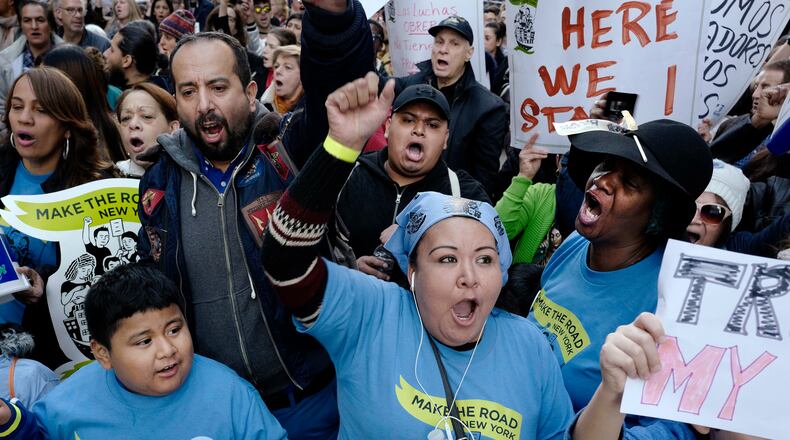'Scared for our lives'
"We're scared for our lives," said Greisa Martinez, 28, policy director at the nonprofit group United We Dream in Washington, and an undocumented immigrant from Mexico who received shelter from deportation in 2014.
Trump built his campaign on a pledge to drive out the more than 11 million undocumented immigrants living in the U.S., which would be one of the largest forced expulsions since President Dwight Eisenhower deported more than 1 million Mexicans in the 1950s. Now, as Trump prepares to take office his plans for fulfilling his central promise are taking shape, and leaving many uncertain of the future.
"A large number of immigrants in the country today have to be very concerned," said Muzaffar Chishti, an attorney at the Migration Policy Institute in Washington.
Obama's executive order
Obama already has deported more people than any prior president, formally removing almost 2.8 million people since taking office, compared with 2 million under George W. Bush and 870,000 under Bill Clinton.
In 2012, the president issued the DACA executive order after a decade of attempts in Congress to pass the Development, Relief and Education for Alien Minors Act. The measure would have provided a path to legalization for the namesake dreamers.
Obama's program entitled more than 1 million people ages 31 and under who were pursuing or had completed an education and who had been in the country for at least five years to receive work permits. He later extended relief to another 3.6 million undocumented parents of American-born children, but that program is on hold pending litigation.
Martinez was brought to the U.S. from Mexico as a child. She grew up in Dallas, attended Texas A&M University, worked off the books as a used car salesperson and lived in constant fear of deportation. In 2014, she was elated when DACA gave her the chance to work.
"I cried," she said. "It was the Social Security number. The Social Security number was something that had haunted me since I was an elementary school kid, when I didn't have anything to put in those nine little boxes."
Still, the president's actions, which shielded nearly half of the nation's undocumented population, deeply angered Republicans who saw them as an end-run around the will of the people.
Trump seeks to expel criminals
Trump said Sunday he would begin his crackdown with criminals. He said that after securing the border, he would make a determination on the remaining immigrants. He called them "terrific people," according to a CBS transcript.
And, as Obama did with his executive order, Trump can take unilateral action with the stroke of a pen.
About 1.9 million "removable criminal aliens" are in the U.S., according to the Department of Homeland Security. An analysis of those numbers by the Migration Policy Institute found that those include both legal and illegal immigrants who committed a variety of misdemeanor and felony offenses. The institute estimated that of those about 820,000 are unauthorized immigrants.
There are an additional half a million fugitives who fled from deportation proceedings and who remain at large, said Jessica Vaughan, director of policy studies at the Center for Immigration Studies, which has argued against admitting high numbers of people.
Deportations will take time
Trump might not be able to move swiftly. Anyone deported would be entitled to a hearing before a judge. Immigration courts already have more than half a million people in line, according to Syracuse University's Transactional Records Access Clearinghouse, a nonprofit that distributes government data obtained through freedom-of-information requests. Wait times can exceed three years.
"I don't think there will be 3 million removals in the first couple years," Vaughan said.
Fearing the information they gave
Nevertheless, young immigrants who entered the DACA program feel they are easy targets, thanks to the trove of data they gave to the U.S. Citizenship and Immigration Services, a branch of the Department of Homeland Security.
The application required not just personal information about the applicants, including elementary school records, old home addresses and health information, but information about undocumented parents and other relatives. The paperwork was so extensive that applicants joked that it should be measured not by pages but by pounds, said Tom Wong, a political science professor at the University of California at San Diego who studied their economic contributions.
"This is heartbreaking in a lot of ways," said Wong. "Folks went above and beyond to essentially give everything."
Cracks in the system
Vaughan said there are "hundreds" of undocumented immigrants with deferred deportation status who were mistakenly approved or who have committed crimes since being approved. She also says there are about 280 gang members who somehow received deferred status.
Still, she said, "I don't think it's likely that this list is going to suddenly become a target-and-locate list for ICE. I think that ICE and the Trump administration have higher priorities."
Lawyers discuss privacy rights
Martinez of United We Dream said her group is in talks with lawyers about what right to privacy, if any, DACA applicants have. The application states that information "is protected from disclosure" to Immigration and Customs Enforcement, the branch of DHS that carries out deportations. Still, it also says "the information may be shared with national security and law enforcement agencies, including ICE and CBP, for purposes other than removal."
"When these people applied for DACA, they were doing that under a promise that information they provided to the government would not be used against them in immigration enforcement actions except under limited circumstances," said Kamal Essaheb, director of policy and advocacy at the National Immigration Law Center. "It would be a significant departure from how people expect to relate to the government if information that individuals gave under a certain promise, if that promise is violated."
About the Author
